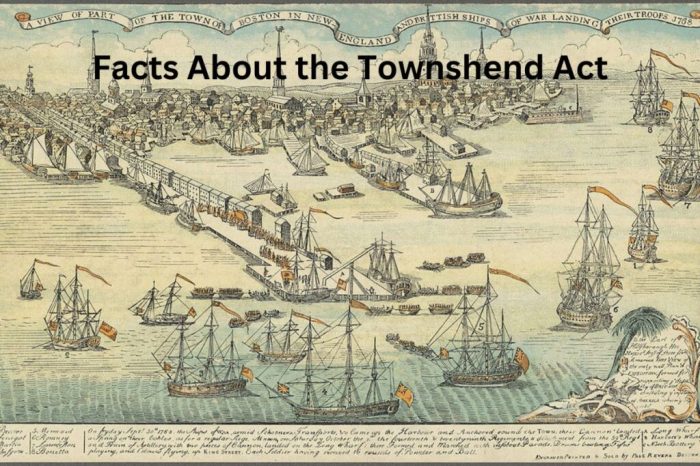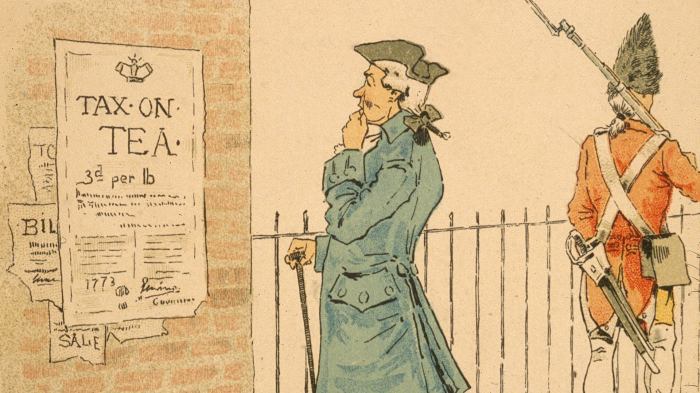The Townshend Acts, enacted in 1767, stand as a pivotal moment in the brewing conflict between Great Britain and its American colonies. These acts, named after British Chancellor of the Exchequer Charles Townshend, aimed to raise revenue from the colonies to help offset the costs of the recent French and Indian War.
The British government believed the colonists should contribute financially to their own defense, a perspective that sparked fierce opposition across the Atlantic.
The Townshend Acts imposed taxes on various goods imported from Britain, including tea, glass, paper, and lead. These taxes, perceived as unfair and unjust by the colonists, ignited a wave of protests and boycotts that would ultimately contribute to the American Revolution.
The colonists argued that they should not be taxed without representation in Parliament, a rallying cry that resonated throughout the colonies and further solidified their sense of identity as a unified force against British rule.
The Townshend Acts
The Townshend Acts, a series of laws passed by the British Parliament in 1767, were a significant event in the escalating tensions between Great Britain and its American colonies. These acts aimed to raise revenue from the colonies to help offset the costs of the French and Indian War, but they ultimately sparked widespread resistance and fueled the flames of the American Revolution.
The Political and Economic Context
The years following the French and Indian War (1754-1763) were marked by significant political and economic shifts in both Great Britain and its American colonies. Britain had emerged victorious from the war, but at a considerable cost. The war had left Britain with a massive national debt, and the government sought to raise revenue to cover its expenses.
The colonies, on the other hand, had played a vital role in the war effort, contributing troops and resources. However, they were also experiencing economic difficulties, partly due to the war’s disruption of trade and the imposition of new British regulations.
The British Perspective
The British government argued that the colonies, as part of the British Empire, had a responsibility to contribute to the common defense and to share in the costs of imperial administration. They believed that the colonies had benefited from the war, as it had secured their borders and expanded their territory.
The British government also viewed the colonies as a potential source of revenue, which could be used to offset the costs of imperial expansion and to fund future military campaigns.
The Taxes Imposed by the Townshend Acts
The Townshend Acts levied taxes on a variety of goods imported into the colonies, including tea, glass, lead, and paper. These taxes were intended to raise revenue for the British government, but they were also designed to assert British authority over the colonies.
The taxes were levied without the consent of the colonial assemblies, and they were seen by many colonists as a violation of their rights as British subjects.
Colonial Reactions to the Townshend Acts
The Townshend Acts, passed by the British Parliament in 1767, aimed to raise revenue from the American colonies to help pay for the costs of the French and Indian War and the ongoing administration of the colonies. The acts imposed taxes on goods imported from Britain, such as tea, glass, paper, and lead.
These taxes were met with fierce opposition from the colonists, who saw them as a violation of their rights and an attempt by the British government to control their affairs.The colonial response to the Townshend Acts was varied, ranging from peaceful protests and boycotts to violent confrontations.
The Role of Samuel Adams and John Dickinson
Samuel Adams, a fiery advocate for colonial rights, was instrumental in organizing resistance to the Townshend Acts. He helped establish the Committees of Correspondence, which served as a network for sharing information and coordinating resistance efforts throughout the colonies. He also wrote and published numerous pamphlets and articles denouncing the acts and urging colonists to stand up for their rights.John Dickinson, a lawyer and political theorist, took a more moderate approach to resisting the Townshend Acts.
He argued that the colonists should refuse to pay the taxes but remain loyal to the British crown. Dickinson wrote a series of influential letters known as “Letters from a Farmer in Pennsylvania,” which argued that the Townshend Acts were unconstitutional and violated the rights of the colonists.
These letters were widely circulated and helped to galvanize colonial opposition to the acts.
Impact of the Townshend Acts on Colonial Unity and American Identity
The Townshend Acts played a significant role in fostering colonial unity and the development of a sense of American identity. The shared experience of resistance to the acts helped to unite the colonists against a common enemy and fostered a sense of shared purpose.
The Townshend Acts, a series of taxes imposed on the American colonies by the British Parliament, sparked widespread outrage and ultimately fueled the American Revolution. While the colonists were protesting against the unfair taxation, they were also dealing with their own everyday concerns, like skin conditions.
If you find yourself in Concord, Massachusetts, and need a dermatologist, you can check out dermatology associates of concord. Just like the colonists fighting for their rights, it’s important to seek the right care for your skin health.
The Townshend Acts ultimately failed, and the colonists won their independence, but the fight for justice and fairness continues in various forms even today.
The protests and boycotts organized by colonists throughout the thirteen colonies demonstrated that they were willing to stand together to defend their rights.The Townshend Acts also contributed to the growing sense of American identity by highlighting the differences between the colonists and the British government.
The colonists began to see themselves as a distinct people with their own unique interests and rights, separate from those of the British. This sense of American identity would play a crucial role in the lead-up to the American Revolution.
The Non-Importation Agreements and Boycotts

The Townshend Acts sparked a wave of colonial resistance, leading to the development of non-importation agreements and boycotts. These agreements, adopted by colonial merchants and consumers, aimed to pressure the British government by refusing to import British goods.
The Organization and Implementation of Colonial Boycotts
Colonial boycotts were organized and implemented through a combination of public meetings, committees, and agreements. The first non-importation agreements were established in response to the Stamp Act in 1765, laying the groundwork for future boycotts. The Sons of Liberty, a prominent group of activists, played a significant role in organizing and enforcing these agreements.
These agreements typically involved pledges by merchants to refuse to import certain British goods, and by consumers to refuse to purchase those goods.
- Committees of Correspondence:To coordinate the boycott efforts, colonial leaders formed committees of correspondence. These committees exchanged information and strategies, fostering unity and cooperation among the colonies.
- Public Meetings and Petitions:Colonial leaders organized public meetings and drafted petitions to rally support for the boycotts. These gatherings provided platforms for disseminating information and mobilizing the colonial population.
- Enforcement:To ensure compliance with the agreements, colonial committees employed a range of tactics, including public shaming, social pressure, and, in some cases, economic sanctions against those who violated the boycott.
The Effectiveness of Boycotts in Pressuring the British Government
The colonial boycotts had a significant impact on British merchants and the British economy. The reduction in imports led to a decline in demand for British goods, causing economic hardship for many merchants and manufacturers. The loss of revenue from colonial trade also put pressure on the British government, highlighting the dependence of the British economy on colonial markets.
- Decline in British Exports:Colonial boycotts significantly reduced British exports to the colonies, resulting in financial losses for British merchants and manufacturers.
- Pressure on British Government:The economic impact of the boycotts, combined with the growing colonial resistance, pressured the British government to reconsider its policies.
- Repeal of the Townshend Acts:In 1770, under pressure from British merchants and the growing colonial resistance, Parliament repealed all the Townshend Acts except for the tax on tea.
Economic and Social Consequences of the Boycotts
The colonial boycotts had both economic and social consequences for both colonists and British merchants.
- Economic Impact on Colonists:While the boycotts aimed to pressure the British government, they also had economic consequences for colonists. The shortage of certain British goods led to price increases and limited consumer choices.
- Social Impact on Colonists:The boycotts fostered a sense of unity and solidarity among colonists, strengthening their resolve to resist British policies. They also encouraged the development of local industries and a greater reliance on colonial-made goods.
- Economic Impact on British Merchants:The boycotts had a devastating impact on British merchants, leading to significant financial losses and unemployment.
- Social Impact on British Merchants:The boycotts also had a social impact on British merchants, as they faced pressure from colonial consumers and their own government to comply with the boycotts.
The Repeal of the Townshend Acts

The Townshend Acts, enacted in 1767, were a series of measures imposed by the British Parliament on the American colonies. These acts, which aimed to raise revenue from the colonies and assert British authority, ignited a wave of colonial resistance and ultimately led to their repeal.
The Reasons Behind the Repeal
The British government’s decision to repeal most of the Townshend Acts was driven by a combination of factors. The acts, intended to generate revenue from the colonies, backfired, sparking widespread protests and boycotts that severely impacted British trade. The economic consequences of the colonial resistance, coupled with mounting political pressure within Britain, forced the government to reconsider its policy.
The Political Maneuvering and Compromises
The repeal of the Townshend Acts was not a straightforward process. It involved a complex interplay of political maneuvering and compromises. Lord North, the new Prime Minister, recognized the futility of the acts and the growing unrest in the colonies.
He proposed a compromise, repealing most of the acts but retaining the tax on tea as a symbol of British authority. This strategy aimed to appease the colonists while preserving Parliament’s right to tax them.
The Significance of the Repeal
The repeal of the Townshend Acts, while a victory for the colonists, did not fully resolve the underlying tensions between Britain and the colonies. The retention of the tea tax served as a constant reminder of British authority and fueled further resentment.
The repeal, however, demonstrated the power of colonial resistance and the willingness of the British government to compromise. It also highlighted the growing gulf between the two sides, setting the stage for the escalating conflict that would ultimately lead to the American Revolution.
The Lasting Legacy of the Townshend Acts

The Townshend Acts, though ultimately repealed, left an enduring mark on the relationship between Britain and its American colonies. They served as a catalyst for a growing sense of American nationalism and contributed significantly to the escalating tensions that eventually led to the American Revolution.
The Long-Term Impact of the Townshend Acts on the Relationship Between Britain and the Colonies
The Townshend Acts, by imposing taxes on goods imported from Britain, exacerbated existing tensions between the colonies and the mother country. The colonists saw these taxes as an infringement on their rights and a blatant attempt by the British government to extract revenue from them without their consent.
The resulting resistance, characterized by boycotts and protests, further strained the relationship, sowing the seeds of discontent that would eventually blossom into rebellion.
The Role of the Townshend Acts in Fostering a Sense of American Nationalism
The Townshend Acts played a pivotal role in fostering a sense of American nationalism. The colonists’ united resistance against the acts, through boycotts and protests, demonstrated a shared sense of identity and purpose. The acts also highlighted the colonists’ growing awareness of their distinct interests and their desire for self-governance.
The Townshend Acts as a Key Event in the Lead-up to the American Revolution
The Townshend Acts were a crucial turning point in the lead-up to the American Revolution. They marked a shift in the colonists’ perception of British rule, moving from passive acceptance to active resistance. The colonists’ defiance of the acts, their willingness to challenge British authority, and their growing sense of unity laid the foundation for the revolutionary movement that would eventually erupt in 1775.
Last Word
The Townshend Acts, though ultimately repealed, served as a crucial catalyst in the escalating tensions between Britain and its American colonies. They ignited a firestorm of protest and fueled the development of a shared American identity. The colonists’ resistance, driven by principles of self-governance and taxation without representation, paved the way for the American Revolution and the birth of a new nation.
The legacy of the Townshend Acts continues to remind us of the power of collective action and the enduring struggle for liberty and self-determination.